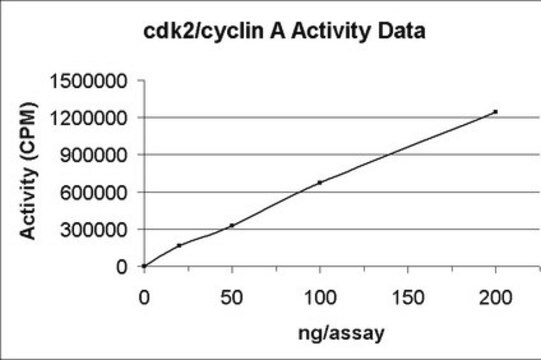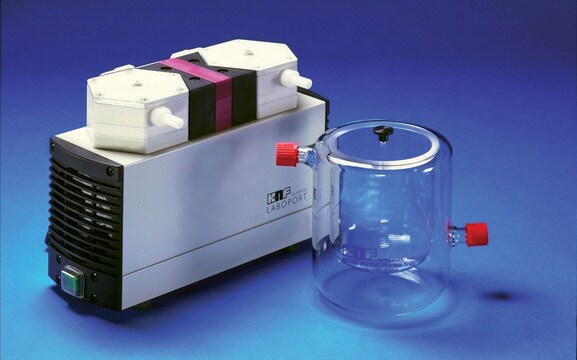14-475-M
Cdk2/Cyclin E Protein, active, 10 µg
Active complex of recombinant full length human Cdk2 containing a C-terminal His6-tag & recombinant full-length human Cyclin E containing an N-terminal GST-tag. For use in Kinase Assays.
Se connecterpour consulter vos tarifs contractuels et ceux de votre entreprise/organisme
About This Item
Code UNSPSC :
12352202
eCl@ss :
32160405
Nomenclature NACRES :
NA.41
Produits recommandés
Source biologique
human
Niveau de qualité
Produit recombinant
expressed in baculovirus infected Sf21 cells
Durée de conservation
1 yr
Poids mol.
Mw 34 kDa (cdk2)
Mw 74 kDa (cyclin)
Fabricant/nom de marque
Upstate®
Technique(s)
activity assay: suitable (kinase)
Solubilité
water: soluble
Numéro d'accès NCBI
Numéro d'accès UniProt
Informations sur le gène
human ... CCNE1(898) , CDK2(898)
Description générale
Research area: APOPTOSIS
Complex of recombinant full length human cdk2 containing a C-terminal His6-tag, and recombinant full-length human cyclin E containing an N-terminal GST-tag. Product Source: Both are expressed by baculovirus in Sf21 insect cells The Cyclin E genes (CCNE1) gene located at 19q12 region in humans is responsible for encoding full-length protein of 410 amino acids.
Complex of recombinant full length human cdk2 containing a C-terminal His6-tag, and recombinant full-length human cyclin E containing an N-terminal GST-tag. Product Source: Both are expressed by baculovirus in Sf21 insect cells The Cyclin E genes (CCNE1) gene located at 19q12 region in humans is responsible for encoding full-length protein of 410 amino acids.
Actions biochimiques/physiologiques
Protein Target: CDK2/cyclinE
Target Sub-Family: CMGC
The Cyclin E1 protein binds to and activates Cyclin-dependent kinase 2 (CDK2), forming an active complex crucial for the initiation and progression of the S phase. Cyclin E/CDK2 complex primarily regulates cell cycle advancement and DNA replication by phosphorylating specific substrates. Elevated Cyclin E protein levels and heightened CDK2 kinase activity are both individually linked to unfavorable prognosis, decreased survival, and resistance to therapy in cancer patients. Overactivation of the Cyclin E/CDK2 complex directly disrupts DNA replication through multiple mechanisms, resulting in DNA double strand breaks (DSBs) and genomic instability. Targeting the oncogenic Cyclin E/CDK2 complex has emerged as a potential therapeutic approach against cancer.
Target Sub-Family: CMGC
The Cyclin E1 protein binds to and activates Cyclin-dependent kinase 2 (CDK2), forming an active complex crucial for the initiation and progression of the S phase. Cyclin E/CDK2 complex primarily regulates cell cycle advancement and DNA replication by phosphorylating specific substrates. Elevated Cyclin E protein levels and heightened CDK2 kinase activity are both individually linked to unfavorable prognosis, decreased survival, and resistance to therapy in cancer patients. Overactivation of the Cyclin E/CDK2 complex directly disrupts DNA replication through multiple mechanisms, resulting in DNA double strand breaks (DSBs) and genomic instability. Targeting the oncogenic Cyclin E/CDK2 complex has emerged as a potential therapeutic approach against cancer.
Conditionnement
Also available in 250μg size as catalog # 14-475M - Call for pricing and availability.
Qualité
routinely evaluated by phosphorylation of histone H1 by cdk2/cyclin E
Forme physique
Ni-NTA agarose
Stockage et stabilité
1year at -70C
Autres remarques
For Specific Activity data, refer to the Certificate of Analysis for individual lots of this enzyme.
Informations légales
UPSTATE is a registered trademark of Merck KGaA, Darmstadt, Germany
Clause de non-responsabilité
Unless otherwise stated in our catalog or other company documentation accompanying the product(s), our products are intended for research use only and are not to be used for any other purpose, which includes but is not limited to, unauthorized commercial uses, in vitro diagnostic uses, ex vivo or in vivo therapeutic uses or any type of consumption or application to humans or animals.
Certificats d'analyse (COA)
Recherchez un Certificats d'analyse (COA) en saisissant le numéro de lot du produit. Les numéros de lot figurent sur l'étiquette du produit après les mots "Lot" ou "Batch".
Déjà en possession de ce produit ?
Retrouvez la documentation relative aux produits que vous avez récemment achetés dans la Bibliothèque de documents.
Notre équipe de scientifiques dispose d'une expérience dans tous les secteurs de la recherche, notamment en sciences de la vie, science des matériaux, synthèse chimique, chromatographie, analyse et dans de nombreux autres domaines..
Contacter notre Service technique





